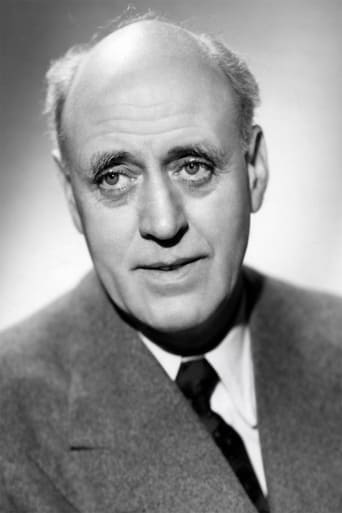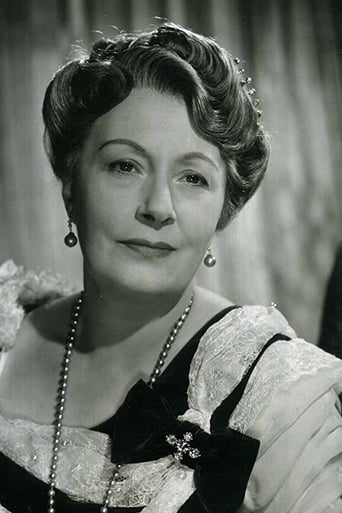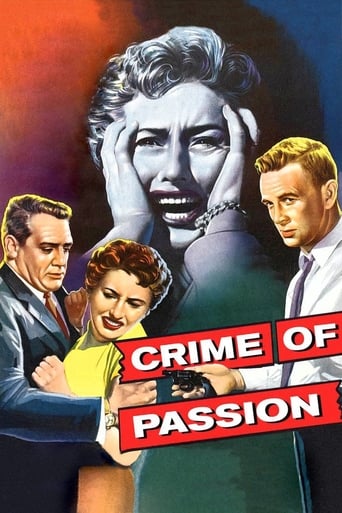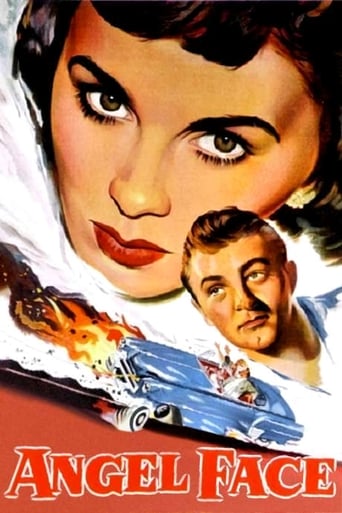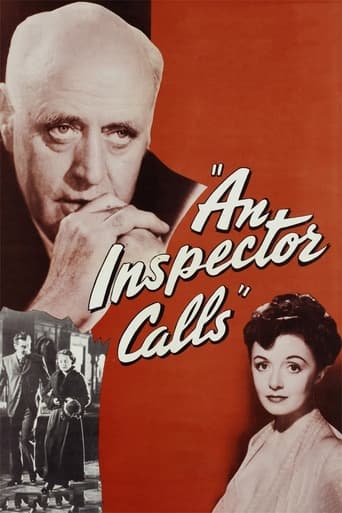
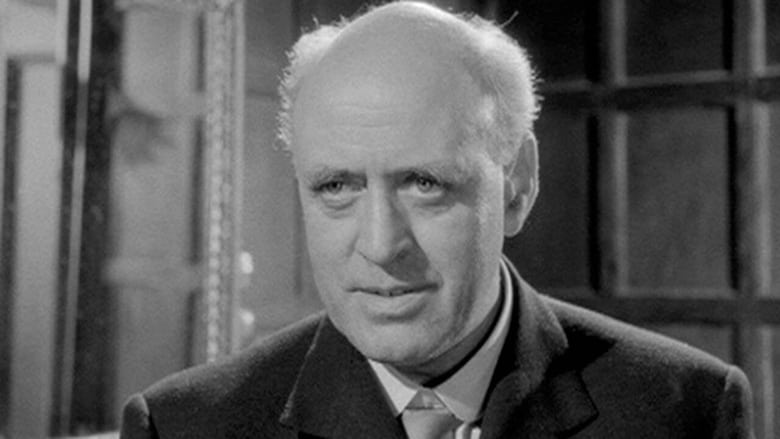
An Inspector Calls (1954)
An upper-crust family dinner is interrupted by a police inspector who brings news that a girl known to everyone present has died in suspicious circumstances. It seems that any or all of them could have had a hand in her death. But who is the mysterious Inspector and what can he want of them?
Watch Trailer
Cast


Similar titles
Reviews
Pretty Good
Good movie but grossly overrated
It's entirely possible that sending the audience out feeling lousy was intentional
Funny, strange, confrontational and subversive, this is one of the most interesting experiences you'll have at the cinema this year.
Being a classic film fan (though do watch films and television of all genres/medium old and new), that 'An Inspector Calls' was based on the classic play with a great story by JB Priestley and had a great actor in Alastair Sim on board were reasons enough to see it.'An Inspector Calls' thankfully did not disappoint. While the 2015 television adaptation with David Thewlis was also wonderful, this film version from 1954 is the marginally better one. Even if it does open up the deliberately confined setting and atmosphere of the play with the inclusion of flashbacks for cinematic reasons no doubt, which some may feel tones down the claustrophobia. To me it isn't as strong as it is on stage but is present still. As well as changing the Inspector's name from Goole to Poole, some may, and have done, find that it misses the point of the character for reasons that won't be gone into here at the risk of spoiling crucial elements of the story. Didn't have as big a problem with this change though it does take away a little from the character's mysteriousness. But what makes this version of 'An Inspector Calls' so good is how well it succeeds on its own merits.It is an incredibly atmospheric film first and foremost, it's not the most technically polished film there is but it does look good. The setting do maintain the sense of confinement and claustrophobia and are produced elegantly. The cinematography and lighting are suitably ominous and while not the most polished look beautiful and add hugely to the atmosphere. A big shout out also has to go to the editing, with 'An Inspector Calls' containing to me some of the best editing of any film seen recently by me and of its kind, with its fluid and seamless transitions between present day and the flashbacks. Something that has been done with wildly variable results elsewhere, many films do it well and just as many others executing it rather clumsily.Regarding the music, much of it is very haunting and adds a lot in giving a sense of constant unease. There are a few instances where it's a touch heavy-handed, my sole complaint of the film but it is not significant enough to bring it down. The script is droll and thought-provoking, never once found it trite, the best lines belong to the Inspector and Sim's delivery has a lot to do with it.Story goes at a deliberate but efficient and never too slow pace, it is unsettlingly suspenseful and very intriguing. The portrayal and dynamic of the central family were beautifully established, there is a lot of great psychological tension and unease when the family are interrogated and the flashbacks were a great way of opening up the story and solving the potential problem while stage to screen adaptations of being stagy. They allowed us to get to know the victim and care for her plight and also the members of the Birling family and how it all affects them. The final twist, while open to interpretation, really sends a chill down the spine.The performances are very fine across the board. Didn't have a problem with Bryan Forbes, though he fares better as a director than an actor in a way. 'An Inspector Calls' is compelling from the get go , but gets even better once the inspector shows up and interrogates the Birlings to utterly transfixing effect. Alastair Sim always had a knack for scene-stealing, whether in lead or support, and he does here in a superb performance that perhaps ranks among his best. Loved his witty but serious line delivery and even more so his understated and oh so expressive eyes and face.Jane Wenham is very touching in her here pathos-filled role. Arthur Young has the right amount of patriarchal authority and crustiness and Olga Lindo brings dignity and class.Concluding, wonderful and not easy to forget. 10/10 Bethany Cox
J.B.Priestley's most famous play is an ingenious composition of knots tied up into an overwhelming mess of guilt and human weakness with many hard lessons learned on the way, until it all dissolves into a trifle, but then the real serious business begins, which we may know nothing about but are left to guess wildly at the consequences...The play-acting is fantastic all the way including the minutest details, like for instance the small girl in the fish and chips shop stating her order exactly before wiping her nose. Alastair Sim is always eerily fascinating with his microcosmic acting where the smallest hints import the greatest significance, and Bryan Forbes, quite young here still, excels in a very variegated display of different sides of a spoiled rake, a mother's boy in the worst sense of the word, but comes out of it alive and perhaps better than the others. This is a dream play for any director, who is bound to have a very good time with it including the actors, and the elegance, the comfortable environment with sofas and boudoirs, also including the smoky theatre bar, adds to the charm and entertainment. This is a theatre classic perfectly transformed into cinema with flashbacks and poignant camera and music effects that must charm anyone at any time. It is all set in 1910-12, but it definitely strikes the timeless zone at once and keeps it there, underscored by what we never shall know will happen next...
J. B. Priestley was a prolific writer of relatively old-fashioned plays, poems, essays, and all the rest of it. One of his major concerns was time. He didn't quite believe in it, not the way the rest of us do.It shows in this play. Alistair Sim enters one of England's stately homes and interrupts an elaborate 1912 dinner, at which everything has gone smoothly. The lord of the manor may be honored with a knighthood and is anxious to avoid any sort of scandal. He's affable but pompous.This family consists of his stand-offish, snobby wife; his beautiful and sensitive daughter; her fiancé, who is a minor industrialist; and the son who seems moody, put out, and has drunk a little too much at dinner.Sim has some questions he wants to ask of the family. His inquiries are polite but not very tactful. A young lady has just died in Brumley. She's taken insect poison or something, a not very pleasant way to check out, and whether or not it was suicide and whether anyone in the family knows anything about the young woman or her motives is the subject of Sims' investigation.Everyone in the family protests. It's a human tragedy, of course, but what have they to do with it? Sims' adroit questioning draws out the fact that everyone in the family has had unwitting contact with the pretty girl, each without knowing of the others' participation in her downfall.The blustering father fired her because she was a troublemaker. She asked for a raise at his factory. (Priestley had socialist leanings.) The daughter insulted her in a fit of pique over an expensive hat. The fiancé had had an affair with her for several months. The stuffy mother had denied her aid when the girl was pregnant and needed charity. The haunted, drunken son turns out to have been the father. So they all contributed to the "human tragedy" in one way or another, important or not.Pacing around on the sidewalk, the fiancé runs into a cop who tells him that there is no inspector with the name that Sims is using. Sims is a fake. The fiancé rushes back to the house and informs the others. The unperturbed Sims is asked to wait in the study, which has no other doors and no open window.The family decides to confront Sims but when they open the study door, he's disappeared. And at this point, the father receives a call that a young woman has just died on the way to hospital, after having taken poison. An inspector is now on the way to question the family.The film doesn't exactly grip the viewer. There is a good deal of drama and guilt in the dining room and flashbacks are used to illustrate the encounters of each family member with the victim. The ending is left up in the air. With Sims in the persona of the inspector, everyone acts guilt ridden, but the moment his identity is questioned some of them revert to type.The semi-supernatural conscience figure (or superego, if you want) wasn't exactly new at the time. Poe's story, "William Wilson," gives us a similar character who may or may not exist. Yet the performances are quite good, some of them, especially Sims with his manufactured smile and his violation of the rules governing politesse. Every time they try to get rid of him, before another embarrassing revelation takes place, he's not quite done. The story itself, of course, is as improbable as all get out -- one working-class babe being driven lower and lower on the social ladder by five members of one family -- independently -- in a city of more than three million? But that's not the point, of course. The point is that no man is an island and that when we cause suffering in someone else, we lose a little bit of ourselves. It's a fundamentally Christian point of view, at least in Edwardian England. I'm not certain how well it fits into our current Zeitgeist, which seems sometimes to owe more to Nietzsche than the New Testament.
This was a nice surprise when I saw it in 1977 or so. Alistair Sim had appeared as Inspector Cockerill in GREEN FOR DANGER shortly after World War II, and gave one of his best performances as that droll Scotland Yarder, who just manages to bungle his successful investigation at the conclusion of that film. Here he finally repeated the role of an inspector of the police - Inspecter Goole, who disturbs a pleasant evening at the Birling mansion in some midland industrial town with news that there has been a tragedy involving the death of a young woman, and she seems to be connected to the family.J. B. Priestly was a highly successful novelist and dramatist of the middle years of the 20th Century. Besides AN INSPECTOR CALLS, he wrote LAST HOLIDAY and the novel (later a television series) LOST EMPIRES. He usually sets his stories (not LAST HOLIDAY) in the Edwardian period. That is the setting of LOST EMPIRES, which follows the London Music Halls in the years before and during World War I, and in this film, set in 1912. As it is set in 1912 it is like Terrance Rattigan's THE SLEEPING PRINCE (filmed as THE PRINCE AND THE SHOWGIRL) - a story whose plot line is complicated by the knowledge of the audience that history is headed in a disaster of war that will destroy the world of the characters.They are quite complacent these Birlings. The father is an industrialist, who has become Lord Mayor of the city. A bluff old codger, he thinks that most of the problems of the world can be covered over by a smile and some cash. His alcoholic son and his daughter and her fiancé seem less cynical, and his wife seems more proper. But each is forced to look at a photograph of the dead girl, shown by the Inspector and suddenly see their sins of pride, lust, cruelty all arising. But in the end when about to admit they did wrong they learn that the Inspector may not be what he said he was. But the conclusion leaves them facing the same crisis that Goole seemed to be on the edge of resolving - and Goole is no longer there to advise them on how to solve it.Sim, with minimal effort, controlled the film although he was off the screen most of the time. His Goole is a pleasant enough figure - apparently just doing his duty - and not being hard on the Birlings. He is just letting their consciences act out their feelings of contrition. But in the end the contrition (for the older Birlings) was too weak. So something stronger was needed to make them aware of their sins.


